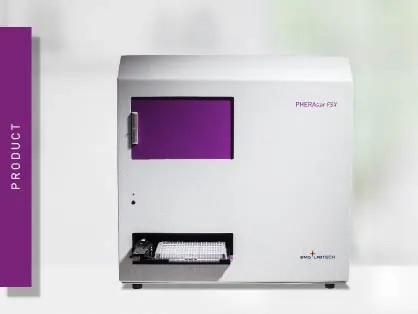
PHERAstar FSX
Powerful and most sensitive HTS plate reader


Improve the efficiency of temperature-sensitive assays with Advanced Assay Stability (AAS), stabilising temperature and reducing evaporation.
Steady experimental conditions are a prerequisite for robust and high-quality data. Temperature is one factor that may significantly affect experimental results, especially when screening assays in 384 or 1536 well formats. If temperature fluctuates when an assay or detection is in progress, changes in thermodynamic conditions can influence many events including molecular interactions, the efficiency and kinetics of chemical and biochemical reactions and the photon yield of luminescence and AlphaScreen®/AlphaLISA® assays. This can result in irreproducible results, potential false positive signals and poor statistical outcomes.
Many factors can influence the internal operating temperature of a microplate reader. In a lab, room temperature can fluctuate depending on location, exposure to sunlight, time of day, local climate, season, heat from neighbouring lab instrumentation and use of heating or air conditioning.
In general, microplate readers can control the internal temperature from a few degrees above room temperature to 45°C or higher. Typically, these instruments work to regulate the measurement chamber temperature. The gap between room temperature and the controllable temperature is mainly due to electronics within the instrument that generate heat, especially if the reader is heavily used.
The new Advanced Assay Stability (AAS) system enables the PHERAstar® FSX to match room temperature conditions and to be maintained at any temperature between 18 and 45°C. It achieves this by automatically heating or cooling the microplate measurement chamber depending on the external environment.

The AAS system provides a steady temperature that is unaffected by external environmental changes while the plate reader is operating - providing improved assay stability and more reliable data.
The special design of the AAS system, which is a closed system, also eliminates the external airflow to the inside of the plate reader and helps keep humidity constant.
An empirical analysis of the benefits of the PHERAstar FSX with AAS system as well as comparisons to competitor readers can be found in the application note Advanced Assay Stability system facilitates a stable detection environment for temperature-sensitive assays.
The AAS system is only available on the PHERAstar FSX microplate reader. It adds about 10 cm additional depth at the rear of the instrument. The overall size of the plate reader with AAS is slightly larger than the standard PHERAstar FSX (see specifications). No additional installations, tubes or devices are required for operation.
The plate carrier has the same plate in/out positions, and the reader feet are in the same position on every PHERAstar FSX to enable seamless automation and uniform compatibility with the BMG LABTECH Stacker.
Powerful and most sensitive HTS plate reader